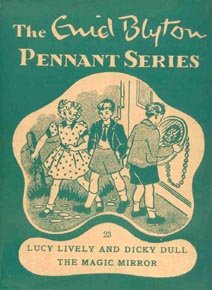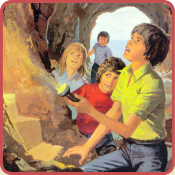
The Enid Blyton Pennant Readers 23

Book Details...
First edition: 1950
Publisher: Macmillan
Cover Art: Jean Main
Illustrator: Eileen A. Soper
Category: The Enid Blyton Pennant Readers
Genre: Mixed
Type: Readers
Publisher: Macmillan
Cover Art: Jean Main
Illustrator: Eileen A. Soper
Category: The Enid Blyton Pennant Readers
Genre: Mixed
Type: Readers
On This Page...
Reprints
- Lucy Lively and Dicky Dull
Story: Specially Written - The Magic Mirror
Story: Specially Written

From the title we have a fair idea of what this tale will involve. A boy and a girl round the ten years of age mark are neighbours, and from the 'Soper' illustration, it's fairly obvious which is which. The different outlooks of both children can be gauged as follows: If Lucy suggests they have a game of Red Indians, Dicky's liable to come up with an excuse:
"Too hot!"
"How about a walk?"
"Too cold."
"Well, come indoors. We could do a jigsaw or there's a book of puzzles you might like."
That offer's turned down as well because having to think hard about solving puzzles would be a little like being at school. Lucy voices an observation that it's no wonder Dicky has so few friends with such an outlook. Dicky then comments on the fact that Lucy is always going places and having fun so, to even things up a little, he's invited out the very next day to a party being held by Lucy's aunt. She's allowed to take a friend so we'll see how it goes.
Unfortunately it's not a very successful outing for Dicky because he doesn't want to join in with the others when they play blind man's buff and he can't even remember the name of his town when they're playing something called 'General Post.' He's not much good at Hunt the Slipper either. Lucy on the other hand contributes to every game and thoroughly enjoys herself. She wins at Musical Chairs and excels at Blind Man's Buff, which impresses everyone immensely; and they all love hearing her laugh.
An illustration shows the boys and girls enjoying themselves, save one who's standing a little apart from the others with a sullen look on his face. Lucy tells Dicky to cheer up and enjoy the get-together because it'll soon be over and, not surprisingly, she's already received three invitations to other children's parties. On the way home, Dicky's sulky when he learns of Lucy's invitations and can't seem to fathom why she has so much luck!
Summer arrives and once again Lucy takes Dicky on an excursion. To a picnic this time with several children and two grown-ups but it's not long before the grumbles are heard. Dicky's legs are aching because they have to walk such a long way but Lucy just laughs, and tries to cheer him up. They're going to have games afterwards so the day looks to be very exciting but for Dicky, it's simply not the case. He doesn't join in but just sits around looking gloomy. He's depicted in a full-page picture relaxing under a tree glancing moodily at the other children — and there's Lucy in front of everyone pointing the way forward as it were. She's the first to see a rabbit and to hear a robin singing for crumbs. She runs here and skips there so it's understandable that everyone wants to be with her.
Harry asks the bubbly little girl to a picnic he'll be having next week, and she even receives an invitation to the Zoo from John. Unbelievably, Dicky still can't seem to understand why nobody else invites him anywhere although, when Lucy manages to have a heart to heart talk with him on their way home, she actually manages to pass on that his 'attitude' is to blame for the miserable life he leads. This story has a moral for children whose teachers use the booklets, and inside is a note stating:
"Direct instruction in morals and ethics can be boring. Indirect instruction however is a sound way of presenting ethics entertainingly."
Fair enough, but what happens to Dicky Dull?
The Magic Mirror
Few kids of Sammy's age could be classed as ugly but it's possible to make an attractive face quite unseemly by the simple act of looking gloomy. Sammy's forehead is wrinkled like an old man's and the corners of his mouth turn down instead of up when he frowns so one could be reminded of Dicky from the previous story because, according to his mother, Sammy's always gloomy and snappy. She wonders what her boy will be like when he gets older, and she tells him that a person's face is shaped whilst still a child so Sammy has a good chance of not looking at all presentable upon maturing.
One day a character called Old Man Blue-Eyes appears on the scene. This chap's eyeballs are as blue as the sky and his mouth is always smiling so everyone likes him, including Sammy. Old Mad Blue-Eyes comments on the fact that Sammy's still wearing the same old frown and his mouth is as sulky looking as ever so it looks as if he'll grow up to be an ugly man one of these days. Sammy says that's exactly what his mother tells him although he doesn't believe her.
This is where the magic mirror comes in because Old Man Blue-Eyes takes Sammy to his cottage and directs the boy's gaze into a looking glass.
What follows is a revelation.
Enid Blyton doesn't tell us whether or not 'Lively' and 'Dull' are the children's actual surnames.
'General Post' must have been a children's party game in past times. 'Postman's Knock' might be the only activity we can recall that relates to letter delivery.
Couldn't be sure that 'Zoo' needs a capital letter unless of course a particular reserve such as The Regent's Park Zoo is named, but Enid Blyton's still the boss.
Harry must be a very active lad because he turns up in so many of the Blyton tales.
#2:
There are other EB stories such as 'Father Time and his Pattern Book' that analyse and comment on children's past or future lives. 'The Enchanted Book' embraces a similar theme. These can be found in Enid Blyton's Gay Street Book and The Yellow Story Book.








